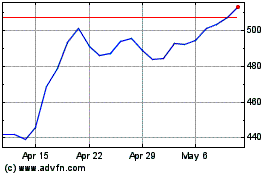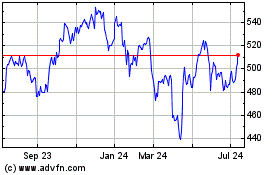UnitedHealth Says ACA Drag Is Easing -- WSJ
January 18 2017 - 3:03AM
Dow Jones News
By Anna Wilde Mathews and Joshua Jamerson
UnitedHealth Group Inc. reported a 56% increase in profit in the
latest quarter, with results fueled by growth in its core insurance
unit and its Optum health-services arm, as well as reduced impact
from its money-losing Affordable Care Act business.
The Minnetonka, Minn., company reported net income of $1.90
billion, or $1.96 a share, compared with $1.22 billion, or $1.26,
in the year-ago quarter. Excluding items, UnitedHealth earned $2.11
a share, compared with $1.40 a year ago. Analysts surveyed by
Thomson Reuters anticipated $2.07 a share. In research notes,
several analysts attributed the better-than-expected profit partly
to strong investment income.
Revenue rose 9% to $47.52 billion in the fourth quarter of 2016,
compared with $47.26 billion projected by analysts.
The large year-over-year gain in net income was tied partly to
UnitedHealth's move in the fourth quarter of 2015 to set aside a
reserve against expected losses on its ACA exchange business, which
pressured the year-ago results. The company said its enrollment in
individual plans dropped sequentially in the fourth quarter of
2016, and it is largely exiting the ACA marketplaces this year,
improving its outlook.
On a call with analysts, UnitedHealth Chief Executive Stephen J.
Hemsley stopped short of speculating about how Republicans would
overhaul the health law, but he dropped some hints about the goals
of the No. 1 U.S. health insurer. He spoke positively about
"state-based health-care markets offering flexible commercial
benefits." The comment seemed to cut against the strong federal
regulatory role in the ACA, which included coverage and plan-design
mandates.
Mr. Hemsley also spoke approvingly about "flexible Medicaid
available to eligible as well as paying beneficiaries," as well as
about high-risk pools, which are insurance plans offered in the
past by states to cover people with costly health conditions.
Republican plans include a return to high-risk pools, which were
phased out under the ACA. The health law guaranteed that unhealthy
people couldn't be denied regular plans in the individual market,
and ensured they couldn't be charged more for coverage based on
their likelihood of requiring costly care.
At Optum, the company's health-services unit, revenue rose 1.2%.
Declines in its OptumRx division partially offset growth from the
health-care delivery businesses. The Optum arm recently announced
that it will purchase Surgical Care Affiliates Inc. for about $2.3
billion, deepening UnitedHealth's role in providing health
care.
On its call with analysts, UnitedHealth offered some new details
about the impact of the deal, which it said aimed to accelerate a
move of surgical procedures out of the costly inpatient setting and
into outpatient centers.
UnitedHealth's Optum has been rapidly expanding its
health-care-provider footprint, and executives said the Surgical
Care deal will add 17 new markets to its current 28. The company
said it expects to grow into roughly four to six new areas
annually, as it pushes toward its goal of providing primary-care
and ambulatory services in 75 U.S. markets. UnitedHealth also
disclosed that around half of Optum's health-care provider business
is from the company's own UnitedHealthcare insurance unit, and
about 12% of Surgical Care's.
The insurer's medical-loss ratio -- the percentage of premiums
paid in claims -- declined 190 basis points year-over-year to 80.8%
in the fourth quarter.
UnitedHealth said revenue from its employer-based and individual
plans rose 12% to $13.5 billion in the quarter. Growth in
employer-sponsored groups offset the decrease in individual benefit
coverage.
The company backed its outlook for earnings this year,
projecting a range of $9.30 to $9.60 a share.
Shares were down about 1.6% in late morning trading, to
$159.25.
Write to Anna Wilde Mathews at anna.mathews@wsj.com and Joshua
Jamerson at joshua.jamerson@wsj.com
(END) Dow Jones Newswires
January 18, 2017 02:48 ET (07:48 GMT)
Copyright (c) 2017 Dow Jones & Company, Inc.
UnitedHealth (NYSE:UNH)
Historical Stock Chart
From Mar 2024 to Apr 2024

UnitedHealth (NYSE:UNH)
Historical Stock Chart
From Apr 2023 to Apr 2024
